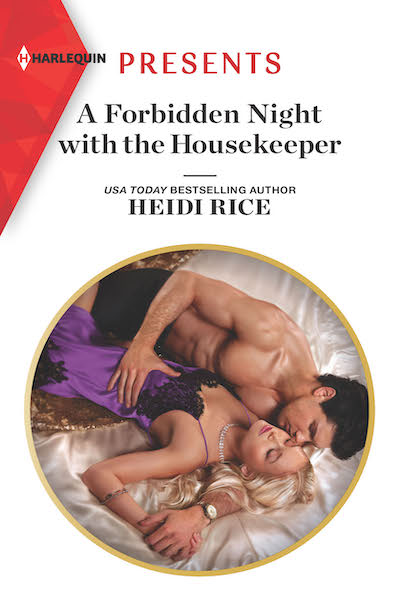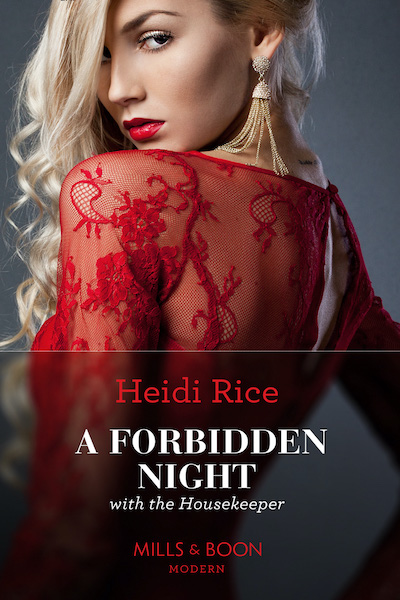Cara Evans stood at the graveside, listening to the priest drone in French, and stared at the miles of vines owned by the neighbouring Durand Corporation covering the adjacent hillside like a patchwork.
She didn’t understand all the words in the eulogy, her French wasn’t fluent. But still she felt sad, and stunned, at the loss of her employer, Pierre De La Mare. The owner of the small vineyard on which they stood.
Not just her employer, her husband, she corrected herself.
Although it felt ridiculous to call Pierre that. He had been old enough to be her grandfather, she’d only been married to him for three days… and now she was his widow.
Marry me, Cara. Take pity on an old man, who does not wish to die alone.
She could feel the eyes of the tiny group of Pierre’s friends and associates who had arrived for the burial staring at her as she watched the sun dip towards the crest of the hill.
And could hear what they were thinking.
Gold-digger. Opportunist. Whore.
But she refused to feel guilty about accepting Pierre’s proposal. Pierre had told her the vineyard would have to be sold. All she stood to gain from their brief marriage was a small stipend from his will to cover the wages he had been unable to pay her for months.
Towards the end, she’d been more like a carer than a housekeeper. She’d bathed Pierre, fed him, helped him dress, wheeled him into the fields he loved each morning so he could watch the vines ripen and had endless conversations each evening about everything from Simone Signoret – his favourite movie star – to the latest news of Maxim Durand, the billionaire vintner who owned all the land surrounding Pierre’s much smaller vineyard. And who Pierre said had been trying to put him out of business for years.
She had never just been Pierre’s employee. She’d been his companion and eventually his friend. Theirs had never been a sexual relationship, although she’d be damned if she’d humiliate Pierre by letting anyone know that. They’d struck a deal, if she married him he would be able to pay her the wages he owed her after his death and she needed that money to help her settle somewhere new.
The pang of loss and anxiety tightened around her chest. She would miss Pierre, but more than that, she would miss La Maison de la Lune, because the house had become her home.
She’d been living at the ramshackle old farmhouse for eleven months, scrubbing the old stone floors until they gleamed, dusting the worn furniture, learning how to work the temperamental washing machine, planting a vegetable patch to save money on their food bill.
She’d never stayed anywhere this long, never felt so settled and secure and it hurt more than it ever had before to know she would be forced to move on soon.
She sighed. She ought to be used to it by now. So why did it feel harder this time? Was it just because she was getting older? She’d turned twenty-one two weeks ago. One thing was for sure, La Maison de la Lune shared a special place in heart.
She squinted into the setting sun, as a large black SUV appeared on the far ridge. A cloud of dust rose in its wake as it bounced over the rutted track towards the family cemetery on the edge of the De La Mare property.
Probably another of Pierre’s casual acquaintances come to judge her.
But then she noted the Durand logo on the side of the jeep as the vehicle stopped and a man got out.
He was tall, and muscular, wearing worn jeans, battered workboots and a grubby white T-shirt, his jaw covered in stubble.
She recognised him instantly, even though she’d never met him and never seen him in such casual attire – only in tuxedos and designer suits in snapped shots online and in tabloid magazines.
Maxim Durand. Pierre’s billionaire neighbour. And France’s most eligible playboy according to Paris Match. Who else could look that ruthless and commanding – and annoyingly handsome – while dressed like a labourer? And who else would be arrogant enough to attend a funeral straight from the fields?
Anxiety skittered up her spine. What was Pierre’s business rival doing coming to his funeral? There had been no love lost between the two men, or certainly not by Pierre. Her employer had talked about Durand often, with utter contempt, and surprising venom. She had loved Pierre, he was charming and paternalistic towards her, but his hatred of Durand had shown a side of her employer she had never quite understood. Pierre had fixated on the other man – every time they had a problem at the vineyard, a small fire, a spring flood, one of the field hands leaving, Pierre had blamed Durand, as if the other man was personally responsible for everything that had gone wrong over the years. Cara had tried not to encourage it. She’d thought Pierre was paranoid – yes, the Durand Corporation had bought up all the land surrounding the De La Mare estate, but Durand had never attempted to buy out Pierre – but now she wondered? Was it possible Pierre had been right? Had Durand simply been waiting for Pierre to die before making his move?
Durand slammed the door of the jeep and marched across the dry earth to the graveside, his movements supremely confident. He certainly didn’t look as if he were in mourning. A strange liquid pull worked its way through her system.
A blush burned her neck as Durand dipped his head and she could feel his gaze, behind dark aviator sunglasses, assessing her in the retro fifties black dress she’d found at the market the previous day. The dress had been too tight, but with its wide skirt, fitted bodice and hourglass shape it had looked elegant. She never wore dresses, feeling more comfortable in what Pierre had laughingly called her ‘work uniform’ of shorts and T-shirts. But she’d wanted to look elegant today, for Pierre. And the dress had suited the occasion. Or so she’d thought until this moment. Durand’s perusal scorched her skin, insulting her and exciting her at one and the same time –and making her feel more exposed than elegant.
But he didn’t speak to her, his gaze leaving her burning face as he approached the graveside and said something to Marcel Caron, Pierre’s lawyer.
The priest finally stopped talking and handed her a trowel. She bent to scoop up a shovel of earth, far too aware now of her breasts straining against the tight bodice.
She sprinkled the chalky red earth on Pierre’s coffin.
‘Give Simone a kiss from me, Pierre,’ she whispered in English. Handing the trowel back to the priest, she said a silent goodbye to her friend.
Swallowing to hold back the emotion closing her throat, she turned from the graveside and walked past the graves of the De La Mare ancestors, heading down the hillside to La Maison de la Lune.
She’d decided not to arrange any kind of wake. Pierre had told her he didn’t want any fuss.
Pierre’s lawyer Marcel was due to come to the farmhouse after the service to give her a cheque for the money Pierre had promised her when they wed. She already had one of De La Mare’s best wines open and breathing – the way Pierre had taught her to do – on the kitchen counter ready for Marcel’s arrival.
She heard some hissed whispers in French as she headed past the other mourners, but no one approached her.
She needed to pack her rucksack and start thinking about where she was going to go next? She doubted there would be much time once the estate had been settled. And if Durand bought it, he would want her off the land quickly. She wanted to be ready to go before she was pushed. And Durand’s presence here today – in his work clothes – suggested he wasn’t going to stand on ceremony.
Should she go to Paris? To London? To Madrid maybe? She’d never been there before.
But as she tried to muster some enthusiasm for her new adventure, all she felt was weary. And sad. And heartsick.
Sod it. She wasn’t going to pack tonight.
Tonight she wanted to remember her friend – a sad smile curved her lips – her husband. So once Marcel left, she would sit out on the terrace, sip Pierre’s beautiful wine and enjoy the twilight magic of the vines she had come to love. The vines that had become a rare oasis of calm, and security and safety amid the chaos of her nomadic life.
She could feel the laser-like intensity of Durand’s gaze behind his sunglasses as she made her way past him to the path out of the graveyard. A disturbing prickle of need ran riot over her skin, and the hot heavy weight settled low in her belly.
She struggled to rationalise the strange, unfamiliar sensations.
Durand was rich and forceful, a notorious womaniser, and exuded an animal magnetism it would be hard for any woman to ignore. And she had so little experience with men. As a foster child, she had learned to hide her light under a very big bushel. It was always better not to be noticed, then you might get to stay a bit longer. And as a teenager she’d been a tomboy, determined not to conform to the stereotype of an unwanted girl looking for love in all the wrong places. She was still a virgin, for goodness sake. Thanks to her rootless existence since leaving foster care she’d never settled down anywhere long enough to build a meaningful relationship with a guy. Well, apart from Pierre! But Pierre – despite their last-minute marriage – had been forty years older than her and frail, not a forceful, magnetic man in his physical prime.
Given her history, it was no surprise she found Durand’s attention a bit… Disconcerting.
But the good news was, she didn’t know him, and she never had to meet him – so this weird heady feeling would pass. Eventually.
Before too much longer Durand was probably going to own the two-hundred-year-old De La Mare vines that produced the best vintage in the region and the beautiful old stone farmhouse that had become the first real home she had ever known.
But tonight the vines and La Maison de la Lune were hers. And she did not need to get Durand’s permission – or anyone else’s permission – to enjoy them.
***
‘How long before the estate goes on the market?’ Maxim Durand asked Pierre De La Mare’s lawyer in French as he watched the girl – De La Mare’s housekeeper, or nursemaid, or whatever the hell she was – walk past him without making eye contact.
Her curves moved sinuously in the vintage dress, the black silk shimmering gold in the sunset, the reddening dusk turning her mass of blonde hair, pinned in a haphazard chignon, to a rich gold. His pulse beat a lusty tattoo in his crotch. Infuriatingly.
Someone had said the old man had got himself a new housekeeper a while ago. He’d expected her to be young and pretty, but not young enough to be De La Mare’s granddaughter. How old was she? Early twenties at the most? Which would make her up to a decade younger than his own thirty-one years. And as much as forty years younger than De La Mare.
Did the old bastard have no shame whatsoever?
Despite her apparent youth though, he would guess the girl had supplied more than just pastoral care for the old roué. De La Mare would have charmed her into his bed the way he’d charmed so many other women. She looked like just his type, too. Hot and available.
But still the pulse of desire and a grudging respect, rather than the distaste he wanted to feel, persisted as she strode into the shadow of the trees, with her head held high.
What was it about the woman that had captivated him as soon as he had arrived? Perhaps it was the flush that hit her cheeks as he checked out her impressive breasts – provocatively displayed for every man here to enjoy in the revealing dress – or the flicker of surprise in her cornflower blue eyes as they met his. Or maybe it was just that he hadn’t slept with a woman in close to three months and he was fatigued after getting up before dawn this morning to assess the new yield. But whatever the reason, he didn’t like it.
Now De La Mare was finally dead, Maxim intended to claim what was rightfully his – not get distracted by the old man’s leftovers.
‘Your haste is quite unseemly, Monsieur Durand,’ the lawyer murmured. ‘Monsieur De La Mare only died a few days ago.’
‘This is business, not personal,’ he lied easily. ‘I wish to be informed as soon as the estate is on the market.’
He’d waited long enough to get hold of the De La Mare Estate. He’d refused to deal with the old bastard, but had ensured that no-one else would offer for the land while the man was alive. Now De La Mare was dead, the vineyard was his for the taking.
‘It is not as simple as that, we must meet tonight at La Maison de la Lune,’ Marcel Caron said. ‘For the reading of the will. Actually, it is good you are here, it will save me sending for you as Monsieur De La Mare requested you attend.’
‘What?’ Maxim’s attention switched to the lawyer – the girl had already disappeared anyway – as he struggled to hide his shock. He ruthlessly quashed the foolish kernel of hope. He knew there would be nothing for him in the man’s will.
‘Monsieur De La Mare requested you attend two days before he died when he made his will.’
‘Why did he even make a will?’ Maxim said, his voice hoarse with anger. ‘He had nothing but debts to pass on and no heirs to pass it to as I understand it.’
Or none he was prepared to claim.
Bitterness rose in his throat like bile.
He swallowed it down as he had so many times before. Ever since he was a small boy and his mother had tied him to his bed to stop him from running through the woods to La Maison de la Lune in a desperate bid to see the man who did not want to see him.
‘You have not heard?’ The lawyer looked sheepish.
‘Heard what? I only returned from my business in Italy yesterday and I’ve been in the fields all day,’ Maxim demanded, as the sick dread – which had been a large part of his childhood – churned in his gut.
‘Mademoiselle Evans, La Maison’s housekeeper, and Monsieur De La Mare were married three days ago, and she is now his widow.’
The bitterness knifed through his gut, as his mother’s face seared his memory – fragile and drawn and exhausted – the way he remembered her on the morning he left Burgundy as an outraged and humiliated fifteen year old.
‘Merde,’ he murmured as his anger became icily cold.
The little English whore hadn’t just been screwing De La Mare, she’d managed to seduce the old bastard into doing something no other woman ever had – putting his wedding ring on her finger.





